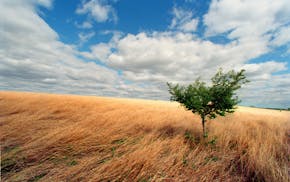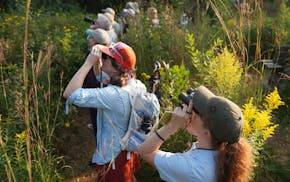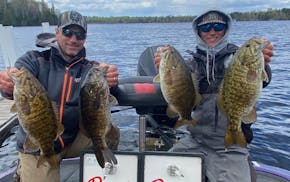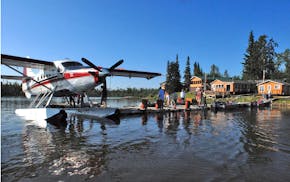Knowing when to fish in Minnesota is almost as important as knowing where to fish. Beginning with the walleye opener in mid-May and ending with muskie fishing just before freeze-up, the state's best open-water fishing follows fairly predictable patterns.
That said, in most years, the overall best time to fish Minnesota lakes is right now. Bluegill and crappie fishing can be excellent, ditto walleye and northern pike action. Also in early to mid-June, some of the state's best bass fishing is available.
Fish caught across the state last week make the point.
On Rainy Lake, on the Minnesota-Ontario border, walleyes and crappies were being caught in water 2½-5 feet deep. Minnows and small jigs were the ticket. Dan and Colleen Crawford of White Bear Lake were among lucky anglers who found jumbo crappies on Rainy last week while staying at Thunderbird Lodge. The lake's water temperature is naturally cooler than that of Twin Cities area lakes, because of Rainy's northernmost location. Rainy's current — its outlet is the Rainy River, flowing west toward Lake of the Woods — is lacking this year and the lake's walleyes seem to be less concentrated as a result, said Billy Dougherty of Dougherty's Rainy Lake Houseboats.
Rainy also is one of the state's best smallmouth bass lakes, and the best fishing for these feisty beasts will begin in coming days when the water touches 56 degrees.
That temperature, and a few degrees more, will trigger world-class smallmouth fishing all across the state's northern border, from Lake of the Woods, east through a hundred or more Boundary Waters Canoe Area Wilderness (BWCA) lakes, not least of which, along the Gunflint Trail, is Hungry Jack Lake.
Managed for trophy smallie fishing by the Department of Natural Resources (DNR), Hungry Jack measures almost 500 acres and also is home to walleye and northern pike. Hungry Jack Lodge on the lake offers boat, canoe and pontoon rentals, as well as a campground, in addition to cabins. The DNR hasn't sampled Hungry Jack Lake for a few years, but most Hungry Jack smallies caught in the agency's most recent test nets measured 15-19 inches. Some in the lake will touch 23 inches.
Now to metro waters.
Among the best of these is Minnetonka, a largemouth bass haven that also boasts excellent crappie and bluegill fishing, as well as walleyes and muskies. The lake is best fished on weekdays to avoid weekend recreational boat traffic. Excellent topwater or whacky-rig largemouth fishing is available, but sneaky approaches and long casts often are required because of the lake's extreme clarity. (Reminder to traveling anglers: Clean, drain and dry your boats before hopping from lake to lake.)
Other name-brand metro lakes that offer good fishing include Waconia, Bald Eagle, White Bear and Forest, among others. Don't have a boat? No problem. These and hundreds of other Minnesota waters can be fished from shore or piers maintained by the DNR or other authorities. For a list, go online to tinyurl.com/m6e5xpjn and use the interactive map to select a pier or shore-fishing site.
Example: A while back I spent a few hours with some kids casting into Wirth Lake in Minneapolis. The DNR map told me how to get there (Take Hwy. 55 to Wirth Parkway, go south to County Rd. 40/Glenwood Ave., go east to pier on east shore, next to boat ramp) and also, with another click, told me the species of fish I could find (black bullhead, black crappie, bluegill, brown bullhead, channel catfish, green sunfish, hybrid sunfish, largemouth bass, northern pike, pumpkinseed, walleye, white crappie, yellow bullhead, yellow perch, bowfin (dogfish), common carp, white sucker, gizzard shad, golden shiner, spottail shiner).
Also helpful for metro anglers, especially of the kid variety, is the DNR's Fishing in the Neighborhood (FIN) program, found online at https://tinyurl.com/jrnws9a8. The site lists fish species available in Twin Cities ponds, lakes and rivers, as well as where rods and other fishing gear can be borrowed and whether fishing piers, playgrounds, picnic areas and restrooms are available.
DNR fisheries officials say about 40 percent of Minnesota's annual walleye harvest occurs in the state's 10 largest lakes: Cass, Kabetogama, Lake of the Woods, Leech, Mille Lacs, Pepin, Rainy, Upper Red, Vermilion and Winnibigoshish. Each offers good to excellent fishing from late spring through fall. But being on the water between now and the second or third week of this month tips the odds in anglers' favor.
Mille Lacs, for instance, has been good this summer, with anglers most commonly hooking walleyes 16-20 inches long (all Mille Lacs walleyes must be released) in about 20 feet of water (early morning and evening are best). The minnow bite has fallen off in favor of leeches and 'crawlers on sliding-sinker rigs. Suzy Fisher of Fisher's Resort says her launch and cabin businesses have been good, and bass anglers from Minnesota as well as Iowa, Missouri, Ohio, Tennessee and other states are now descending on Mille Lacs hoping for one of the lake's 20-plus-inch smallies.
Hoping this report inspires anglers or would-be anglers to wet a line in the next few weeks, I'll conclude with snapshots of two more of the state's big lakes, Vermilion and Upper Red:
• Vermilion: Walleyes in early morning and the last hour of daylight are being caught in 11-14 feet of water, said Ed Tausk of Vermilion Dam Lodge. Cast or troll for northern pike any time, and in between enjoy primo smallmouth and largemouth bass fishing on a lake as pretty as any in North America.
• Upper Red: New limit this year, three walleyes only, with one allowed over 17 inches. The jig-and-minnow bite in recent days was strong, my Star Tribune colleague Tony Kennedy reports, with walleyes of all sizes cooperating, including those over 17 inches.

Anderson: DNR wants to cut Minnesota walleye limit to 4, but some want the idea thrown back

Anderson: It's time to get politics out of Minnesota conservation

Anderson: Minnesota birders, bikers, hikers should pay their fair share

Anderson: Hooked on bass, young Minnesotan survives brain surgery, lands 8-pounder to win Bassmaster Classic


